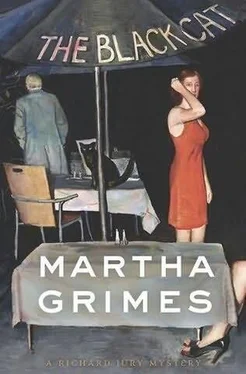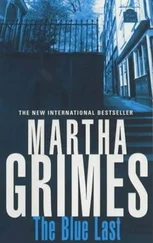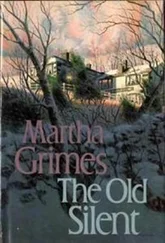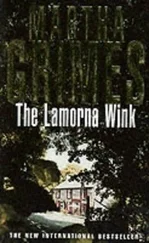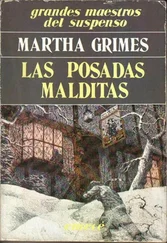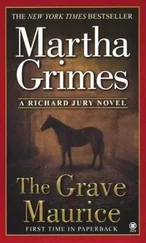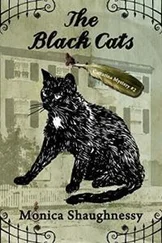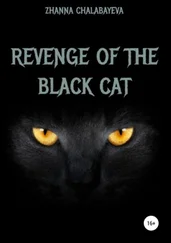He nodded. “Rosie…” Her face looked small and pinched. “You’re going to have to come along with me.” Jury felt even more forlorn. He shouldn’t feel this way. She had shot two people in cold blood.
And yet it hadn’t been cold, had it? For her, probably even more than for Chris Cummins, it was all a parlor game, and his being here was the last move in it. What she said next confirmed this notion.
“I guess so. I guess I lost.” She got up. “I have to change my clothes.”
He knew he shouldn’t let her out of his sight, but he did. It was a terraced house, a second-floor flat, with no means of egress except for the door, unless she meant to throw herself out a bedroom window. He doubted she would do that.
While she was gone, Jury looked around the room, whose details now he better understood: the row of Beatrix Potter figures on the shelf of the arched bookcase, the Paddington Bear lamp, the display of shells-the accoutrements of childhood. With its high ceiling, long windows, arched shelves, the room had the bones of sophistication, but she had drawn over it the skin of naïveté.
When she walked back in, she was once again the woman who’d surprised him in Cigar. Her outfit, a blue shawl-necked sweater and straight black skirt, was not as clingy as the dress she’d worn, but it was still potent. She had applied makeup, not too much, and had traded the slippers for dark-brown-and-black-ribboned shoes with skyscraper heels.
She swung the strap of a small handbag up to her shoulder. It matched the shoes. “Whose shoes, Rosie?”
“Valentino. You like them?” She held out a foot as if he were about to fit it with a glass slipper.
“I certainly do.”
“Okay, let’s go,” she said to him.
Once through the door, she locked it. She preceded him along the narrow hall that led to the top of the stairs. At one point she stumbled, the skyscraper heels proving too much even for her, but she righted herself and went on, a girl dying to be grown up, stumbling in her mother’s high-heeled shoes.
Jury found him, not surprisingly, in the garden on the narrow path screened by masses of tulips and foxglove. He heard the snip of the shears and saw the floppy hat. The sun was hot on Jury’s head. The willow and Japanese maple spilled sunlight across the path.
“Hello, Bobby.”
Bobby was standing near a canvas of creeping phlox so variously tinted in watercolors that it might have been painted by one of the Impressionists. He was immersing an armful of purple tulips in a bucket of water. He rose from his kneeling position. “Mr. Jury.” He took off his hat and wiped his arm across his forehead and smiled bleakly. “I’m just cutting some flowers for the church.” He paused. “A funeral.” Again, he paused. “Will police ever release Mariah’s body for burial?”
Jury could tell from the look-a drowned look, as if Bobby himself had been plunged into water like the stems of the cut nowers-that any news would be bad news. Jury hoped this wasn’t. “Very soon, I expect. Look, we’re fairly certain we’ve got the person who murdered Mariah, Bobby. Not much of a consolation for you, but at least something.”
Absently, Bobby clicked the garden shears. “Who?”
“It’ll be public soon enough.” He went on to tell him about the double murder, Chris Cummins and Rose Moss.
Bobby sat down hard on the white iron bench. “Good God.” He looked up at Jury as if trying to assess his presence. Real or not?
Jury sat beside him. “Not that it makes it easier to understand, but Rose Moss was obsessed with Mariah. Well, that pretty much goes without saying.”
“Are you saying Mariah was gay?” He frowned in disbelief. “That’s not-”
Jury shook his head. “Gay? No. The affair-if it can even be called that-was probably very brief and for Mariah, probably an experiment, or just something she was curious about. And there’s only Rose Moss’s account, so how much is true, how much wishful thinking, I don’t know. Anyway, Mariah knew in a short while, sex with another woman just didn’t appeal to her. I know you thought Mariah was very retiring, but-”
Bobby was shaking his head. “Not that way. She was good at sex, she was very good, a lot better than me. It was as if she had some old knowledge of it. I don’t know how to say it.” He scratched his head. “As if it came naturally. Not from a lot of experience of it, but as if she were discovering it as she went along, almost as if inspired her or something.” He laughed abruptly. “Talk about wishful thinking.”
“I don’t think it is, Bobby, not where you were concerned. She was giving up that life. She wanted to be with you.”
Bobby smiled ruefully, pinched a dry leaf from the stem of a daisy near the bench. “You’re saying that to make me feel better.”
“I’m not. She really loved you. It’s what got her killed.” Jury was sorry he’d said that, for it sounded brutal when he’d meant to be consoling. “I’m sorry. That sounded as if you were at fault.”
“No it doesn’t. I’m glad you told me. I really didn’t know if Mariah loved me, because there was always something held back. I knew there was more to her than what she was letting me see. I knew all of those weekend absences had to do with something other than visiting some old school chum or working an extra job. I knew there was more than that.”
They sat for a few moments in the generous light and silence of the garden where Bobby Devlin seemed completely at home. Jury thought there was solace here, his gaze traveling up the path with its deep borders of dianthus and lavender and roses, the soft air pungent with their perfume; at the drifts of snowdrops, cornflowers, and poppies, at life illimitable.
“It bloody sucks, doesn’t it, life?” Bobby eventually said, his voice verging on tears.
Jury wasn’t about to tell his companion beside him on the bench that he was a fortunate man. “It bloody does,” he said. Then, as if to appease some god of the garden, added, “Sometimes.”
“So what,” asked Jury, “were you doing in Slough?”
“Trying to get out of it,” said Melrose.
They were tromping along the old road that led to the Man with a Load of Mischief, which sat atop a gentle hill that overlooked the village of Long Piddleton. They were looking for Melrose’s dog, Mindy, who often came up here to sleep in the courtyard. Joey was walking beside Jury, occasionally rushing at some small rustling in the undergrowth.
Melrose went on: “Haven’t you noticed the motorways all mass together there? There’s the M4, the M40, the M25-”
“M25’s the Ring Road.”
Melrose stopped. “Thank you. I know it’s the Ring Road.”
“Why were you going back to London, anyway? You’d done all that. And I will say done a fair job, too.”
“A ‘fair’ job, is that all I get?”
“A fairly good one, then.”
Melrose stopped again. “Don’t knock yourself out with the approval. Has it occurred to you that I get all the rum jobs? The fools’ errands? You, on the other hand, get the glamour stuff. You get to shoot up half of London-”
“I don’t carry a gun, as you know. I can’t imagine what you might have forgotten that was worth a trip all the way back to Boring’s.”
Melrose sighed. “What difference does it make?” He turned to clap at the dog.
“Aggro,” said Jury, then repeated it, in case Melrose was missing the annoyance in his voice. “Aggro. What a bloody awful name.”
Melrose shook his head. “No it isn’t. It fits with the names of my horse and my goat.”
How could he say that without strangling?
Melrose continued: “Listen, just be glad Theo Wrenn-Browne didn’t get to name him. He was all for Aardvark.”
Читать дальше
